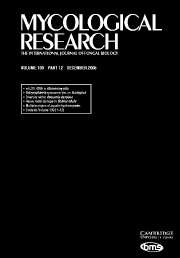Crossref Citations
This article has been cited by the following publications. This list is generated based on data provided by
Crossref.
Klewer
Luerßen
Graf
and
Siemens
2001.
Restriction Fragment Length Polymorphism Markers to Characterize Plasmodiophora brassicae Single‐spore Isolates with Different Virulence Patterns.
Journal of Phytopathology,
Vol. 149,
Issue. 3-4,
p.
121.
Siemens, J.
Nagel, M.
Ludwig‐Müller, J.
and
Sacristán, M. D.
2002.
The Interaction of Plasmodiophora brassicae and Arabidopsis thaliana: Parameters for Disease Quantification and Screening of Mutant Lines.
Journal of Phytopathology,
Vol. 150,
Issue. 11-12,
p.
592.
Brodmann, David
Schuller, Astrid
Ludwig-Müller, Jutta
Aeschbacher, Roger A.
Wiemken, Andres
Boller, Thomas
and
Wingler, Astrid
2002.
Induction of Trehalase in Arabidopsis Plants Infected With the Trehalose-Producing Pathogen Plasmodiophora brassicae.
Molecular Plant-Microbe Interactions®,
Vol. 15,
Issue. 7,
p.
693.
Arbeiter, A.
Fähling, M.
Graf, H.
Sacristán, M.D.
and
Siemens, J.
2002.
Resistance of Arabidopsis thaliana to the obligate biotrophic parasite Plasmodiophora brassicae.
Plant Protection Science,
Vol. 38,
Issue. SI 2 - 6th Conf EFPP,
p.
519.
Fähling, M.
Graf, H.
and
Siemens, J.
2003.
Pathotype Separation of Plasmodiophora brassicae by the Host Plant.
Journal of Phytopathology,
Vol. 151,
Issue. 7-8,
p.
425.
Fähling, M.
Graf, H.
and
Siemens, J.
2004.
Characterization of a Single‐Spore Isolate Population of Plasmodiophora brassicae Resulting from a Single Club.
Journal of Phytopathology,
Vol. 152,
Issue. 7,
p.
438.
Graf, H.
Fähling, M
and
Siemens, J.
2004.
Chromosome Polymorphism of the Obligate Biotrophic Parasite Plasmodiophora brassicae.
Journal of Phytopathology,
Vol. 152,
Issue. 2,
p.
86.
Tanaka, Shuhei
Mido, Hiroaki
and
Ito, Shin-ichi
2006.
Colonization by two isolates of Plasmodiophora brassicae with differing pathogenicity on a clubroot-resistant cultivar of Chinese cabbage (Brassica rapa L. subsp. pekinensis).
Journal of General Plant Pathology,
Vol. 72,
Issue. 4,
p.
205.
Asano, T.
and
Kageyama, K.
2006.
Growth and movement of secondary plasmodia of Plasmodiophora brassicae in turnip suspension‐culture cells.
Plant Pathology,
Vol. 55,
Issue. 1,
p.
145.
ANDO, SUGIHIRO
TSUSHIMA, SEIYA
TAGIRI, AKEMI
KAMACHI, SHINICHIRO
KONAGAYA, KEN‐ICHI
HAGIO, TAKASHI
and
TABEI, YUTAKA
2006.
Increase in BrAO1 gene expression and aldehyde oxidase activity during clubroot development in Chinese cabbage (Brassica rapa L.).
Molecular Plant Pathology,
Vol. 7,
Issue. 4,
p.
223.
Takahashi, H.
Ishikawa, T.
Kaido, M.
Takita, K.
Hayakawa, T.
Okazaki, K.
Itoh, K.
Mitsui, T.
and
Hori, H.
2006.
Plasmodiophora brassicae‐induced Cell Death and Medium Alkalization in Clubroot‐resistant Cultured Roots of Brassica rapa.
Journal of Phytopathology,
Vol. 154,
Issue. 3,
p.
156.
Siemens, Johannes
Keller, Ingo
Sarx, Johannes
Kunz, Sabine
Schuller, Astrid
Nagel, Wolfgang
Schmülling, Thomas
Parniske, Martin
and
Ludwig-Müller, Jutta
2006.
Transcriptome Analysis of Arabidopsis Clubroots Indicate a Key Role for Cytokinins in Disease Development.
Molecular Plant-Microbe Interactions®,
Vol. 19,
Issue. 5,
p.
480.
Alix, K.
Lariagon, C.
Delourme, R.
and
Manzanares‐Dauleux, M. J.
2007.
Exploiting natural genetic diversity and mutant resources of Arabidopsis thaliana to study the A. thaliana–Plasmodiophora brassicae interaction.
Plant Breeding,
Vol. 126,
Issue. 2,
p.
218.
Choi, Jaemyung
and
Hwang, Ildoo
2007.
Cytokinin: perception, signal transduction, and role in plant growth and development.
Journal of Plant Biology,
Vol. 50,
Issue. 2,
p.
98.
Siemens, J.
Glawischnig, E.
and
Ludwig‐Müller, J.
2008.
Indole Glucosinolates and Camalexin do not Influence the Development of the Clubroot Disease in Arabidopsis thaliana.
Journal of Phytopathology,
Vol. 156,
Issue. 6,
p.
332.
Donald, E. C.
Jaudzems, G.
and
Porter, I. J.
2008.
Pathology of cortical invasion by Plasmodiophora brassicae in clubroot resistant and susceptible Brassica oleracea hosts.
Plant Pathology,
Vol. 57,
Issue. 2,
p.
201.
Ludwig-Müller, Jutta
and
Schuller, Astrid
2008.
Sustainable disease management in a European context.
p.
291.
Ludwig-Müller, Jutta
and
Schuller, Astrid
2008.
What can we learn from clubroots: alterations in host roots and hormone homeostasis caused by Plasmodiophora brassicae.
European Journal of Plant Pathology,
Vol. 121,
Issue. 3,
p.
291.
Cao, Tiesen
Srivastava, Sanjeeva
Rahman, Muhammad H.
Kav, Nat N.V.
Hotte, Naomi
Deyholos, Michael K.
and
Strelkov, Stephen E.
2008.
Proteome-level changes in the roots of Brassica napus as a result of Plasmodiophora brassicae infection.
Plant Science,
Vol. 174,
Issue. 1,
p.
97.
Osaki, Kohei
Tanaka, Shuhei
and
Ito, Shin-ichi
2008.
Pathogenicity of Plasmodiophora brassicae populations from small, spheroid, resistant-type clubroot galls on roots of clubroot-resistant cultivars of Chinese cabbage (Brassica rapa L. subsp. pekinensis).
Journal of General Plant Pathology,
Vol. 74,
Issue. 3,
p.
242.


